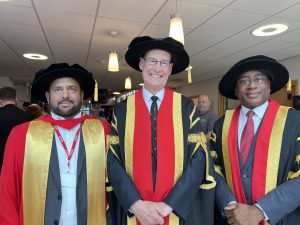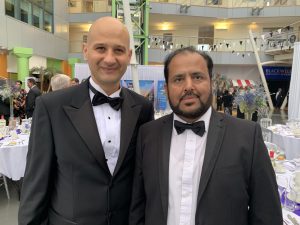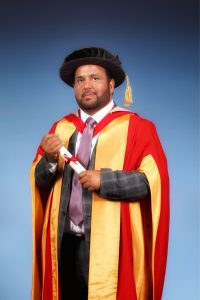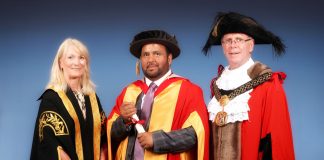During South Asian Heritage Month, we reflect on the achievements of countless individuals within the South Asian community who, having made the UK their home, have enriched our society and left a lasting legacy.

Image: Dr Javed Bashir
Among them is Dr Javed Bashir, a Lecturer in Policing at Leeds Trinity University. He came to the UK, at the tender age of 10, settled in the small town of Keighley, and has reached great heights.
“I came to UK from Pakistan in 1980,” Dr Bashir told Asian Standard.
The lecturer went on to explain: “My father came to this country in 1962, because there was a labour shortage, and the local textile industry were looking for people from the Asian subcontinent to come and work in the UK.
“There was unemployment in Asian countries, and because of the Mangla Dam, which caused displacement in Mirpur, there was a major dislocation.
“At that time there was no visa requirement to visit this country. All the former British colonies could get a ticket and come here.
“So, my father who was working as a pharmacist at a hospital in Pakistan, left everything to come to the UK for better opportunities and landed himself a job within the textile industry.”

Image: Dr Javed Bashir
In the late 1970’s after finding success working in the textile mills, Dr Bashir’s father, gradually called the rest of his family to the UK sensing better opportunities for his children.
“There was better education in this country, better employment opportunities, so we joined my father in 1980.”
Being new to the UK at the age of 10, Dr Bashir faced multiple challenges.
“It was a struggle for me when I came, as I didn’t know a word of English and at age ten, I had already missed out on a lot of schooling, so getting through my GCSE’s was a real challenge.
“Our parents however, had high aspirations for us, so they gave us the push and motivation we needed to learn new things, and get the education that they never had the chance of getting.
“So, I learned the language in five or six years and also managed to complete my schooling in time, then went on to pursue other university degrees.”
Post his education, Dr Bashir managed to secure working within his communities. His role was mainly to help integrate and uplift communities.
He said, “I started working in 1992 with the council as a community development officer, there I reached out to the community and helped them engage.
“Then I moved on to the education department in 2003, as ethnic minority children coordinator, where I worked with children who are hard to reach, I supported them and made sure that they do well in life.
“Around the same time,” Dr Bashir adds, “I worked with the community in terms of community cohesion.
“There were riots in 2001, in Bradford, there was a lot of friction between the Asian community and the English community, so I did a number of programmes and projects to bring them together.”
The father of four played a critical role in uniting communities during the 2001 Bradford riots. At the time he was the owner of a local curry house, called the ‘Balti Chef’.
Just a month following the riots, Dr. Bashir extended a gracious invitation to 40 Bradfordians, all hailing from diverse backgrounds, cultures, and faiths. He welcomed them to his restaurant for a complimentary meal, with the condition that they sit together and engage in meaningful conversations.
This gesture aimed to foster understanding and unity among the participants, encouraging open dialogue and empathy after the recent period of unrest.
“I continued to work with a number of projects and programmes to bring different communities together, after all we need to live in peace and harmony,” he adds.
In 2009 Dr Bashir formed the Professional Muslim Institute (PMI) providing high level networking opportunities for professional Muslims to develop their professional, business, and social networks.
From 2012, Dr Bashir worked to improve safeguarding for faith institutions.
He told Asian Standard: “In 2020, I worked nationally as safeguarding consultant to improve safeguarding and professionalism of faith groups in Waltham Forest, Peterborough, Rochdale, and West Yorkshire,”

Image: Dr Javed Bashir
In July 2022, Dr Javed Bashir was awarded an honorary doctorate for his contributions and work towards bringing communities together.
“Now I am working as a lecturer in policing at Leeds Trinity University, I am working with the undergraduates and postgraduate students, delivering training, and teaching them about different skills particularly around policing the community, and also making them understand how to engage with different communities. For this we take them out to places of worship like Gurudwaras, Mandir or Masjids, and deliver training on how they can work with different communities,” he explains.
When asked what has changed, from 1980 to 2023, Dr Javed Bashir says: “So if you speak of my father’s generation, they weren’t as educated but had high aspirations for their children.
“But honestly, this has changed, now the younger generations, they don’t have the same aspirations as the older ones. So, I believe there has been a change in aspirations.
“When I used to go to school, we Asian people were like only two percent. But now it has become the other way round you see.”
Did being in such a minority translate to racism? Dr Bashir is asked, “At that time racism was different, it was more verbal racism, somebody might call you n***** or a p***. However, in terms of integration we didn’t have any issue at that time.
“When my father came to the UK, they were more English than Englishmen. They used to wear a three-piece suit; they ditched their salwar kameez. But now you see, it’s the other way round. Now you see more people wearing salwar kameez and topis (hats). In those days, they were more westernised”.
Lack of integration between South Asians and white communities is something what worries Dr Bashir.
“Asian people now live in closed communities, for example the Manningham area in Bradford, if we walk all the way from town centre towards Leeds Road, we find that the majority of people are Asians. Then you go to towards Leeds, to places like Hosforth, it is the other way round there is a white majority. So, there is no integration between the communities.
“You are settled in your own area, you have your own local shops, you don’t move, this adds to my worry, because this results in very little integration now.”
Dr Bashir says that integration has only gotten smaller.
“When my father moved in, there was no distinction between Indian and Pakistanis and other Asian countries. Now we have moved into smaller groups, to live in. Even within Pakistanis, there are smaller groups now.
“Even in schools, due to the concentration of local communities, mixing is not as much as it should happen.”
“We don’t need to give up our culture, we can still retain our culture, we can remain Indians, Pakistanis, White, Sikhs, Hindus or Muslims, whatever you are, we can still mix in different communities, this will only create a better understanding among communities.”
When asked what his message is to fellow South Asians who he wishes to inspire, Dr Bashir says: “My message is obviously, it’s not easy, keep trying, keep working hard, there are no shortcuts, there will be challenges, but never be afraid of challenges. You need to become a part of the larger community as well, because integration is the key if you wish to understand things better”.




